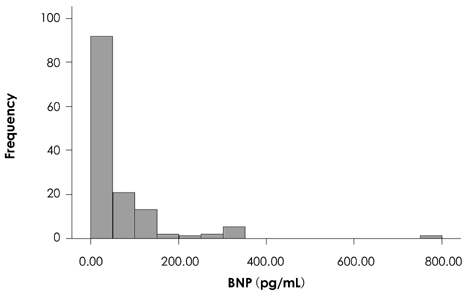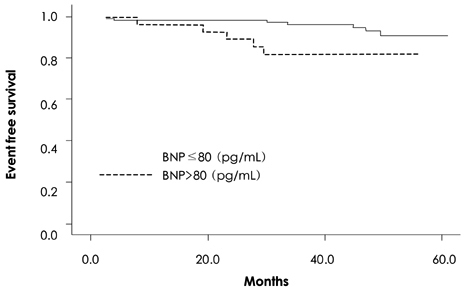Korean Circ J.
2009 Jan;39(1):26-31. 10.4070/kcj.2009.39.1.26.
B-Type Natriuretic Peptide and Long-Term Prognosis in Low-Risk Patients With Unstable Angina
- Affiliations
-
- 1Department of Cardiology, Wonju College of Medicine, Yonsei University, Wonju, Korea. yubs@yonsei.ac.kr
- KMID: 1769510
- DOI: http://doi.org/10.4070/kcj.2009.39.1.26
Abstract
-
BACKGROUND AND OBJECTIVES: In acute coronary syndrome (ACS), the B-type natriuretic peptide (BNP) level is a strong predictor of mortality. Most ACS patients have a history of myocardial infarction (MI) or high risk ACS, clinical entities that are anticipated to lead to elevated BNP levels. Therefore, we assessed the relationship between BNP levels and long-term prognosis in low-risk patients with unstable angina (UA).
SUBJECTS AND METHODS
Between September 2002 and June 2004, BNP was measured in baseline samples from 137 patients referred for angiography. UA was defined as a clinical diagnosis paired with significant coronary artery narrowing. Patients had to exhibit no ST segment changes or abnormal Q waves, no elevation of cardiac enzymes, and no abnormal left ventricular diastolic or systolic function or regional wall motional abnormality on echocardiography. Major adverse cardiac events (MACEs) were defined as cardiovascular death, MI, or readmission due to heart failure.
RESULTS
The mean patient age was 62.2+/-10 years, and 70 (51.1%) of the patients were men. The mean follow-up duration was 44.5 months. Six patients died due to cardiac causes, 4 were admitted due to heart failure, and 2 had MIs. The mean BNP level was not different between patients suffering MACEs and those not suffering MACEs. Other characteristics were similar between the groups. Kaplan-Meier survival curves showed a statistically significant benefit in the BNP < or =80 pg/mL group (p=0.037). There were no significant prognostic factors on multivariate analysis.
CONCLUSION
A single BNP measurement was not an independent prognostic factor, but was related to event-free survival in patients with low-risk UA.
MeSH Terms
Figure
Reference
-
1. Shah PK. New insights into the pathogenesis and prevention of acute coronary syndromes. Am J Cardiol. 1997. 79:17–23.2. Anderson JL, Adams CD, Antman EM, et al. ACC/AHA 2007 guidelines for the management of patients with unstable angina/non-ST-Elevation myocardial infarction: a report of the American College of Cardiology/American Heart Association Task Force on Practice Guidelines (Writing Committee to Revise the 2002 Guidelines for the Management of Patients With Unstable Angina/ Non-ST-Elevation Myocardial Infarction) developed in collaboration with the American College of Emergency Physicians, the Society for Cardiovascular Angiography and Interventions, and the Society of Thoracic Surgeons endorsed by the American Association of Cardiovascular and Pulmonary Rehabilitation and the Society for Academic Emergency Medicine. J Am Coll Cardiol. 2007. 50:e1–e157.3. Logeart D, Thabut G, Jourdain P, et al. Predischarge B-type natriuretic peptide assay for identifying patients at high risk of readmission after decompensated heart failure. J Am Coll Cardiol. 2004. 43:635–641.4. Chung IH, Yoo BS, Ryu HY, et al. The relationship between the early follow-up BNP level and congestive status or prognosis in acute heart failure. Korean Circ J. 2006. 36:200–207.5. de Lemos JA, Morrow DA, Bentley JH, et al. The prognostic value of B-type natriuretic peptide in patients with acute coronary syndromes. N Engl J Med. 2001. 345:1014–1021.6. Omland T, Persson A, Ng L, et al. N-terminal pro-B-type natriuretic peptide and long-term mortality in acute coronary syndromes. Circulation. 2002. 106:2913–2918.7. Bellomo R, Ronco C, Kellum JA, Mehta RL, Palevsky P. Acute renal failure - definition, outcome measures, animal models, fluid therapy and information technology needs: the Second International Consensus Conference of the Acute Dialysis Quality Initiative (ADQI) Group. Crit Care. 2004. 8:R204–R212.8. Rakowski H, Appleton C, Chan KL, et al. Canadian consensus recommendations for the measurement and reporting of diastolic dysfunction by echocardiography: from the Investigators of Consensus on Diastolic Dysfunction by Echocardiography. J Am Soc Echocardiogr. 1996. 9:736–760.9. Hillis GS, Ujino K, Mulvagh SL, Hagen ME, Oh JK. Echocardiographic indices of increased left ventricular filling pressure and dilation after acute myocardial infarction. J Am Soc Echocardiogr. 2006. 19:450–456.10. Maisel AS, Krishnaswamy P, Nowak RM, et al. Rapid measurement of B-type natriuretic peptide in the emergency diagnosis of heart failure. N Engl J Med. 2002. 347:161–167.11. Omland T, Aakvaag A, Vik-Mo H. Plasma cardiac natriuretic peptide determination as a screening test for the detection of patients with mild left ventricular impairment. Heart. 1996. 76:232–237.12. Yoo BS, Kim WJ, Jung HS, et al. The clinical experiences of B-type natriuretic peptide blood concentrations for diagnosis in congestive heart failure: the single hospital experience based on the large clinical database. Korean Circ J. 2004. 34:684–692.13. Omland T, Aakvaag A, Bonarjee VV, et al. Plasma brain natriuretic peptide as an indicator of left ventricular systolic function and long-term survival after acute myocardial infarction: comparison with plasma atrial natriuretic peptide and N-terminal proatrial natriuretic peptide. Circulation. 1996. 93:1963–1969.14. Morrow DA, de Lemos JA, Sabatine MS, et al. Evaluation of B-type natriuretic peptide for risk assessment in unstable angina/non-ST-elevation myocardial infarction: B-type natriuretic peptide and prognosis in TACTICS-TIMI 18. J Am Coll Cardiol. 2003. 41:1264–1272.15. Galvani M, Ottani F, Oltrona L, et al. N-terminal pro-brain natriuretic peptide on admission has prognostic value across the whole spectrum of acute coronary syndromes. Circulation. 2004. 110:128–134.16. Omland T, de Lemos JA, Morrow DA, et al. Prognostic value of N-terminal pro-atrial and pro-brain natriuretic peptide in patients with acute coronary syndromes. Am J Cardiol. 2002. 89:463–465.17. Jernberg T, Stridsberg M, Venge P, Lindahl B. N-terminal pro brain natriuretic peptide on admission for early risk stratification of patients with chest pain and no ST-segment elevation. J Am Coll Cardiol. 2002. 40:437–445.18. James SK, Lindahl B, Siegbahn A, et al. N-terminal pro-brain natriuretic peptide and other risk markers for the separate prediction of mortality and subsequent myocardial infarction in patients with unstable coronary artery disease: a Global Utilization of Strategies To Open occluded arteries (GUSTO)-IV substudy. Circulation. 2003. 108:275–281.19. Baek KK, Jeon ES, Rhee IL, et al. N-terminal pro-B-type natriuretic peptide as a prognostic marker in acute coronary syndrome. Korean Circ J. 2004. 34:1070–1081.20. Kragelund C, Gronning B, Kober L, Hildebrandt P, Steffensen R. N-terminal pro-B-type natriuretic peptide and long-term mortality in stable coronary heart disease. N Engl J Med. 2005. 352:666–675.21. Omland T, Sabatine MS, Jablonski KA, et al. Prognostic value of B-Type natriuretic peptides in patients with stable coronary artery disease: the PEACE Trial. J Am Coll Cardiol. 2007. 50:205–214.22. St John Sutton M, Pfeffer MA, Plappert T, et al. Quantitative two-dimensional echocardiographic measurements are major predictors of adverse cardiovascular events after acute myocardial infarction: the protective effects of captopril. Circulation. 1994. 89:68–75.23. Richards AM, Nicholls MG, Yandle TG, et al. Plasma N-terminal pro-brain natriuretic peptide and adrenomedullin: new neurohormonal predictors of left ventricular function and prognosis after myocardial infarction. Circulation. 1998. 97:1921–1929.24. Tateishi J, Masutani M, Ohyanagi M, Iwasaki T. Transient increase in plasma brain (B-type) natriuretic peptide after percutaneous transluminal coronary angioplasty. Clin Cardiol. 2000. 23:776–780.25. Marumoto K, Hamada M, Hiwada K. Increased secretion of atrial and brain natriuretic peptides during acute myocardial ischaemia induced by dynamic exercise in patients with angina pectoris. Clin Sci. 1995. 88:551–556.
- Full Text Links
- Actions
-
Cited
- CITED
-
- Close
- Share
- Similar articles
-
- Clinical Implication of B-type Natriuretic Peptide in the Elderly
- Biomarkers in Heart Failure: Focus on B-type Natriuretic Peptide
- B-type natriuretic peptide may have a role in the management of patent ductus arteriosus
- B-type natriuretic peptide in anesthesia practice to predict adverse cardiovascular outcomes
- A Novel Risk Stratification Model for Patients with Non-ST Elevation Myocardial Infarction in the Korea Acute Myocardial Infarction Registry (KAMIR): Limitation of the TIMI Risk Scoring System



